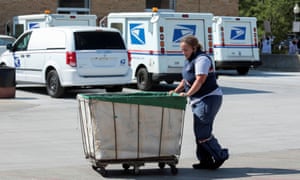
A federal judge this afternoon ordered the US Postal Service (USPS) to adopt “extraordinary measures” at some processing locations to ensure the timely delivery of millions of ballots before Tuesday’s presidential election.
US district judge Emmet Sullivan said he was ordering the measures in places where election mail processing scores for completed ballots returned by voters were below 90% for at least two days from October 26-28.
The list includes Alabama, Alaska, Atlanta, central Pennsylvania, Colorado, Wyoming, Detroit, Fort Worth, Texas; Indiana; South Carolina; Louisiana; the Mid-Carolinas, Mississippi; northern New England and Oklahoma, among others, Reuters writes.
The measures are outlined in the Postal Service’s October 20 “Extraordinary Measures Memorandum.”
Washington state attorney general Bob Ferguson sought a hearing in a separate Postal Service case after data showed “consistently poor Election Mail performance data in certain regions.”
Ferguson said data showed on-time delivery of ballots sent by voters in Michigan’s Detroit district dipped as low as 57%, while national processing has been 93% or higher.
Postal Service spokesman Dave Partenheimer declined to comment, but the service issued a memo today outlining numerous extra measures it is taking to deliver ballots, including arranging for after-hours handoffs with boards of elections.
Starting today, employees can use the Express Mail network to get completed ballots returned by voters entered close to or on Election Day, November 3, to their intended destination.
The Postal Service does not recommend mailing ballots less than seven days before state deadlines.
Some states accept ballots if postmarked by Election Day, while others require actual receipt by then.
Yesterday, the Postal Service said it delivered 122 million blank and completed ballots ahead of Tuesday’s presidential election, in which there has been record early voting.
More than 85 million Americans have already cast ballots in the presidential election, according to the US Elections Project at the University of Florida.



